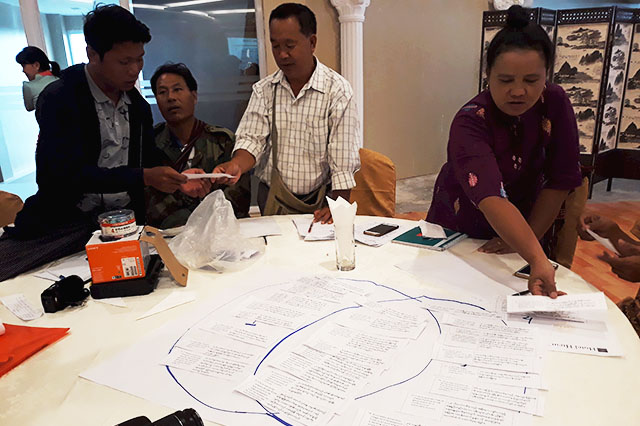Building Understanding of EIA and Responsible Business for Civil Society Groups in Southern and Eastern Shan State

MCRB, in partnership with Metta Development Foundation and Environmental Conservation and Farmer Development Organization (Shan), held a workshop on EIA in Taunggyi on 3-4 October for around 40 partiicpants from civil society organisations (CSOs) and community-based organisations (CBOs) from southern Shan State to follow up an earlier introductory workshop in June.
Senior office-holders in the new Myanmar Environmental Assessment Association, which brings together EIA consultants and other experts, presented on EIA practice from the 3rd party/consultant perspective. Shwetaung/Apache Cement presented their experience from a company perspective and made available hard copies of their EIA/EMP and Biodiversity Action Plan for study.
Deputy Director U Tun Tun Oo of the Environmental Conservation Dept in Taunggyi presented on current challenges for effective regulation and oversight of EIA processes in Shan State, noting the department’s limited resources for the area to be regulated. His presentation outlines statistics and details of the EIA, IEE and EMPs which had been handled by the Taunggyi ECD office.
Zaw Htun, Executive Director of the Integrated Development Executive Association (IDEA) outlined some recommendations on improving the EIA process from the experience of civil society organisations. The workshop was also attended on 4 October by Khaing Nyi Nyi Kyaw MP, Chairman of the Shan State Hluttaw’s Natural Resources Committee who gave a parliamentary perspective.
Vicky Bowman, MCRB Director outlined the distinction between a company’s legal obligation to address its negative impacts, which should be identified by EIA consultants in the EIA process, and avoided or mitigated through the Environmental Management Plan, and the interest of a company in going beyond its legal obligations, to strengthen its ‘social licence to operate’ i.e. support of the community. The latter should be addressed separate to the EIA. They should be discussed directly between the company and the communities - and other stakeholders – and might even form part of a Community Development Agreement (CDA) for long-term and complex projects, which could also incorporate provisions around consultation and complaints handling.
Participants played an interactive game in which 30 examples of company activity were identified as either (1) compliance obligations (2) opportunities to improve sustainability and create shared value (3) philanthropy and (4) other types of activities such as marketing spend, or corruption. It was noted that the distinction between 2, 3 and 4 sometimes depended on the company’s situation and approach.
Aung Kyaw Soe of MCRB spoke about good practice under the UN Guiding Principles on Business and Human Rights concerning complaints and grievance handling and showed the video made by MPRL E&P about the system they had designed which involves community volunteers in villages around their oil production block in Mann Field.
In polling of audience participants (14% of whom said they had read an EIA, 77% of whom had not, and 9% were unsure), 46% thought that there was still significant room for improvement in the way the 2015 EIA Procedure was being implemented. 43% of the audience thought that failure to obtain adequate community input was the main problem hindering effective EIA implementation, with 34% attributing it to failure to follow the rules. 46% of the audience thought lack of information about projects was the biggest problem. When asked what means they preferred to establish initial contact with companies to address grievances, 46% preferred to work with community volunteers in touch with the company. Participants were particularly keen for training on EIA rules and regulations, how to participate effectively, how to analyse draft EIA reports.
The Taunggyi workshop was followed by an introductory workshop in Kengtung on 8-9 October, for CSOs, CBOs and political party representatives from 8 townships in Eastern Shan State political parties of NLD, LNDP, SNDP, SNLD, ANDP on "Responsible Business and the Role of Environmental Impact Assessment (EIA)". Further such workshops are planned by MCRB for Kayah State.
Read also
- Building Environmental Legal Advocacy Skills for Civil Society Leaders
- Investors Need to Identify their Impacts on Myanmar’s Biodiversity and Ecosystems Early On, to Avoid Cost and Conflict Later
- Working with Community Groups in Shan State on Responsible Business and EIA
- Join MCRB and Thant Myanmar in the Battle to Beat Plastic Pollution
- Our Biggest Challenge as Consultants is Companies Refusing to Admit Projects Could Have Negative Impacts
 English
English မြန်မာ
မြန်မာ မြန်မာ (unicode)
မြန်မာ (unicode)








